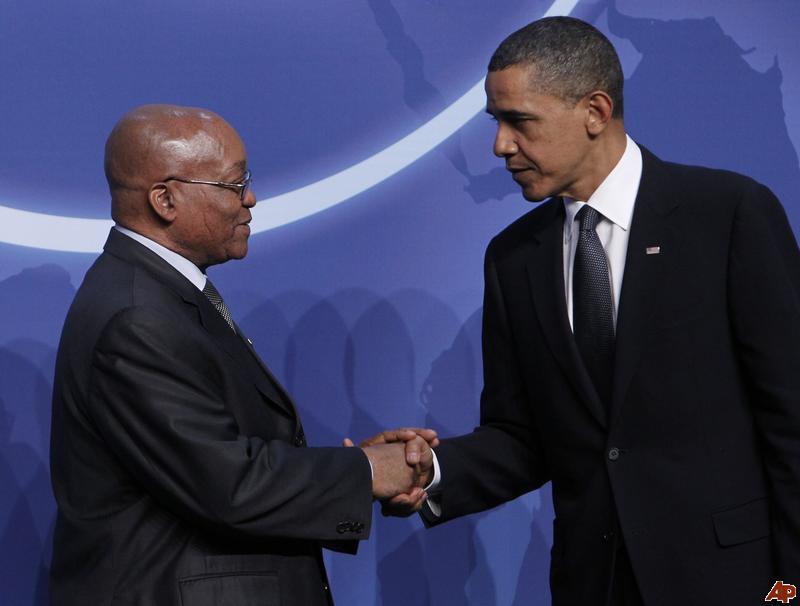South Africa
Swaziland: South Africa's high commissioner rejects democratic transformation

The Trade Union Congress of Swaziland (TUCOSWA) is banned and its leaders were arrested and prevented from
South Africa’s ‘sub-imperial’ seductions

By Patrick Bond
South Africa: Centenary of the 1913 Land Act
By Colin Bundy
South Africa: Pro-government faction attacks COSATU's Zwelinzima Vavi
Zwelinzima Vavi is under attack for being too critical and independent of the ANC government.
By Benjamin Fogel
South Africa: Chris Hani would be angry at ANC 'adopting our class opponents' policies'

By the National Union of Metalworkers of South Africa
BRICS: ‘Anti-imperialist’ or ‘sub-imperialist’?

South African President Jacob Zuma and friend.

Whose turn to carve?
March 18, 2013 -- In Durban, South Africa, five heads of state meet on March 26-27, 2013, to assure the rest of Africa that their countries’ corporations are better investors in infrastructure, mining, oil and agriculture than the traditional European and US multinationals. The Brazil-Russia-India-China-South Africa (BRICS) summit will also include 16 heads of state from Africa, including some notorious tyrants. A new $50 billion bank will probably be launched.
African solidarity with the Venezuelan revolution and tributes to Hugo Chavez

Hugo Chavez's funeral, March 8, 2013.
[Below are statements issued by left and progressive organisations in Africa. More will be posted as they come to hand.]
* * *
Taking forward the revolutionary life and symbolism of hugo Rafael Chavez Frias
March 10, 2013 -- The Democratic Left Front (DLF) of South Africa joins the millions of poor and working people and their mass movements in Venezuela, the Caribbean, Latin America and across the world who celebrate the revolutionary and emancipatory life and symbolism of Hugo Rafael Chávez Frías. Since his tragic passing away on March 5, our hearts have drawn inspiration and courage from his example and symbolism.
As the 9 million people who attended his funeral on March 8 showed, Chavez represented and personified immense hope and possibility: hope for the wretched of the Earth, hope and faith in the ability of the mass of exploited and oppressed people to self-organise and challenge inordinate power relations in society, and thereby be their own liberators, and realistic hope in the possibility of constructing a socialist alternative to the barbarism of capitalism.
Anti-fracking movement goes global, climate-change mafia warns

More than 2000 people protest against coal seam gas in the Illawarra, NSW, Australia, October 2011.
By Farida Iqbal
February 10, 2013 -- Green Left Weekly -- The shale gas industry-commissioned white paper, The Global Anti-Fracking Movement: What it Wants, How it Operates and What’s Next, makes for some very interesting reading. It was produced late last year by Control Risks, an “independent, global risk consultancy specialising in helping organisations manage political, integrity and security risks in complex and hostile environments”.
The white paper focuses on shale gas, but it also discusses coal seam gas. Shale gas is what features in the film Gasland by Josh Fox, which details the destructive effects of “fracking” on communities in the US.
A global movement has emerged to combat the risks to water and air quality, health and farmland that shale gas mining poses. Australia has both shale and coal seam gas reserves.
South Africa: ANC endorses 'boycott Israel' campaign
By Ali Abunimah
December 21, 2012 -- Electronic Intifada -- For the first time ever, the African National Congress (ANC), the ruling party in South Africa, today made the Palestinian call for boycott, divestment and sanctions (BDS) on Israel part of its official policy.
Mbuyiseni Ndlozi of BDS South Africa said the decision “by the ANC’s National Conference, its highest decision making body, is by far the most authoritative endorsement of the Boycott, Divestment and Sanctions (BDS) against Israel campaign”.
In a press release, BDS South Africa explained: "In October 2012, the ANC’s International Solidarity Conference (ISC) declared its full support for the Boycott, Divestment and Sanctions (BDS) against Israel campaign.
"Today, Lindiwe Zulu announced at the ANC’s 53rd National Conference plenary session, the ANC’s official endorsement .... Giving muscle to resolution 39 (b), the ANC has committed to set up a steering committee to implement these ISC resolutions.
